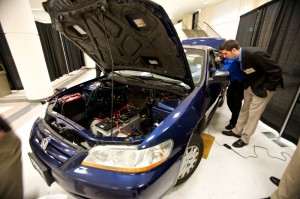$22,500 awarded to clean technology winners
Teams who won the 3rd annual University of Washington Environmental Innovation Challenge invented solutions to some of the world’s most pressing environmental issues. Wind energy. Electric car improvements. Biomass energy. Water purification. Algal biofuel efficiency. The 2011 event also had a range of other clean-tech innovations with 17 teams from Washington state universities (UW, WSU, WWU and SPU) competing. Undergraduate, graduate and PhD students from engineering, business, economics, philosophy and a number of other disciplines joined forces to tackle the environment.
 Grand Prize of $10,000 = Voltaic
Grand Prize of $10,000 = Voltaic
A group of UW undergraduate engineers and business students created an electric vehicle modular drive train that can replace drive trains of gas-powered engines in existing models. The electric module can be customized to fit inside any car and the team displayed a Honda outfitted with its prototype electric engine to show how it powers the car.
2nd Prize of $5,000 = PotaVida
This UW PhD team (an electrical engineer, bio-engineer and policy analyst) created a device that measures water quality with a reusable, solar-powered electronic indicator for monitoring solar disinfection of drinking water. Their inexpensive indicator won a $40,000 design award last year and will be field tested in Bolivia this summer. PotaVida is advised by experts at PATH and Microsoft as well as UW professors.
Three honorable mention prizes of $2,500 each went to other UW interdisciplinary teams. Pterofin invented an affordable, more versatile alternative to wind turbines; the new device is lighter than current wind technology and harnesses wind energy at lower wind speeds. BioTek has a patented and patent-pending suite of tools to help optimize and scale the growing algal biofuel industry; their instruments and software are low-cost and field-ready. C6 Systems created a novel system to turn woody biomass into charcoal (or biochar) at forestry sites; their biochar can be sold to heating/electric plants or used as soil enhancement.
Starbucks VP of Sustainable Procurement Sue Mecklenburg, one of many business, science and venture capital judges at the event, said, “It just gets better every year.”
“The Environmental Innovation Challenge is supposed to be more than a university-level science fair. The goal is to be able to take these ideas into a real, revenue-generating business,” said James Barger, UW undergraduate mechanical engineering student who serves as VP of finance for Voltaic.
The UW Environmental Innovation Challenge is sponsored by the UW Foster School of Business Center for Innovation and Entrepreneurship, UW College of Engineering, UW College of the Environment and UW Center for Commercialization.
1 Response
Leave a Reply
You must be logged in to post a comment.

Pingback : Academic Resources